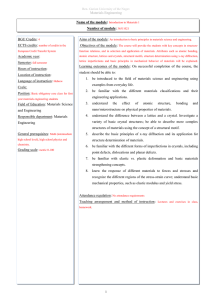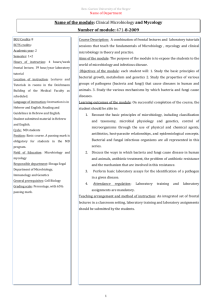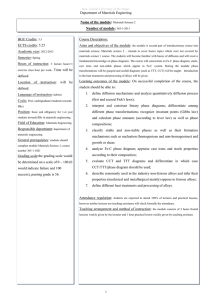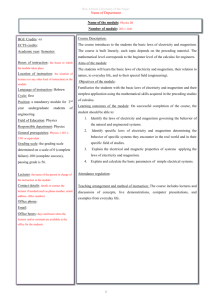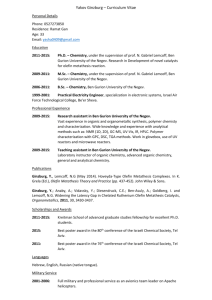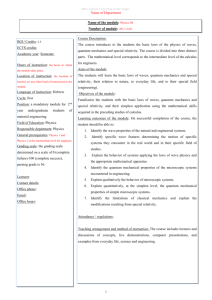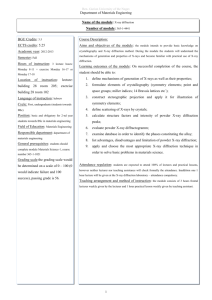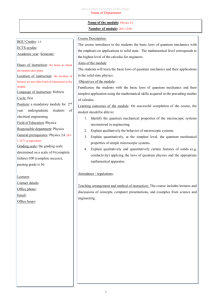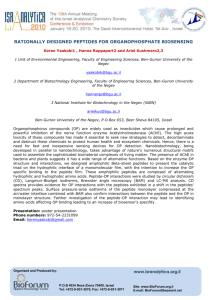Ben- Gurion University of the Negev Materials Engineering Name of
advertisement
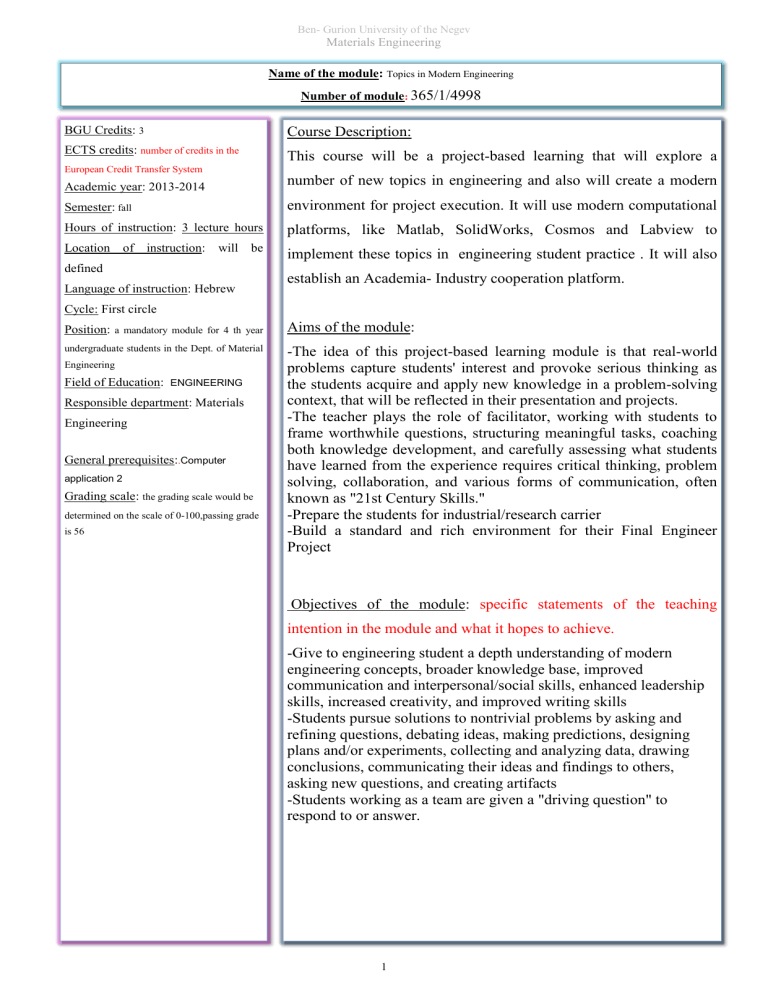
Ben- Gurion University of the Negev Materials Engineering Name of the module: Topics in Modern Engineering Number of module: 365/1/4998 BGU Credits: 3 Course Description: ECTS credits: number of credits in the This course will be a project-based learning that will explore a European Credit Transfer System Academic year: 2013-2014 number of new topics in engineering and also will create a modern Semester: fall environment for project execution. It will use modern computational Hours of instruction: 3 lecture hours platforms, like Matlab, SolidWorks, Cosmos and Labview to Location of instruction: implement these topics in engineering student practice . It will also will be defined Language of instruction: Hebrew establish an Academia- Industry cooperation platform. Cycle: First circle Position: a mandatory module for 4 th year Aims of the module: undergraduate students in the Dept. of Material -The idea of this project-based learning module is that real-world problems capture students' interest and provoke serious thinking as the students acquire and apply new knowledge in a problem-solving context, that will be reflected in their presentation and projects. -The teacher plays the role of facilitator, working with students to frame worthwhile questions, structuring meaningful tasks, coaching both knowledge development, and carefully assessing what students have learned from the experience requires critical thinking, problem solving, collaboration, and various forms of communication, often known as "21st Century Skills." -Prepare the students for industrial/research carrier -Build a standard and rich environment for their Final Engineer Project Engineering Field of Education: ENGINEERING Responsible department: Materials Engineering General prerequisites:.Computer application 2 Grading scale: the grading scale would be determined on the scale of 0-100,passing grade is 56 Objectives of the module: specific statements of the teaching intention in the module and what it hopes to achieve. -Give to engineering student a depth understanding of modern engineering concepts, broader knowledge base, improved communication and interpersonal/social skills, enhanced leadership skills, increased creativity, and improved writing skills -Students pursue solutions to nontrivial problems by asking and refining questions, debating ideas, making predictions, designing plans and/or experiments, collecting and analyzing data, drawing conclusions, communicating their ideas and findings to others, asking new questions, and creating artifacts -Students working as a team are given a "driving question" to respond to or answer. 1 Ben- Gurion University of the Negev Materials Engineering Lecturer: Dr. Eugene Berman Assessment: Contact details: Room 25,building 61 how the students will be assessed in the module Office phone:08-6461163 1. Presentation Email: eberman@bgu.ac.il 2. Project presentation 80% Office hours: Monday, from 11 to 13 pm 20% ___________________ 100% Module evaluation: at the end of the semester the students will evaluate the module, in order to draw conclusions, and for the university's Work and assignments: detailed instructions for the students regarding the work and assignments in the module (including dates of examination and due dates) 1. Presentation of the project subject- midterm internal needs. 2. Presentation of the project- end of the semester Confirmation: the syllabus was confirmed by the faculty academic advisory committee to be valid on 2019-2010 Time required for individual work: in addition to attendance in class, the students are expected to do their assignment and individual work ( two hours per week and 24 hours before exam). Last update: 2014 Module Content\ schedule and outlines: the content and structure of the module, including detailed subjects, and their order. Lectures: 1.Introduction to Modern Engineering 4h 2.Design a Modern Project Environment; Computer based Platforms( SolidWorks, Matlab,LabView,Cosmos) 3.Computer aided Design/Computer aided Manufacturing/Computer aided Engineering 4.Computer aided Measurement 4h 3h 3h 5.Remote Engineering, Virtual Instruments, Virtual Laboratory 3h 6.Computer aided Experimentation 4h 7.Computer controlled systems/processes 4h 8.Mechatronics,Robotics,Quality Control 3h 9.Knowledge Management :Retrieving/ Evaluation/Assessing/Organizing Information 10.Bussiness for Engineers: become familiar with financial and management issues of project development 11.Global Engineering: Virtual Team, Collaborative projects 6h 3h 3h Required reading: The literature and reading items that students in the module are expected to read. Computer integrated Experimentation,Edward B. Magrab, Springer-Verlag Computer Aided Design and Manufacturing, M.P.Groover, E.W.Zimmers,Prentice-Hall International Basic Robotic Concepts, John M. Holland, Howard W Sams&Co Additional literature: the Bibliography of the module. A Theoretical Approach to Mechatronics Design, Jacob Buur http://www.ni.com/academic/students/learn-labview * All learning material will be available to the students on the module's website (high-learn)/ library/ electronic documents available to BGU students. 2 Ben- Gurion University of the Negev Materials Engineering 3 Ben- Gurion University of the Negev Materials Engineering 4 Ben- Gurion University of the Negev Materials Engineering 5 Ben- Gurion University of the Negev Materials Engineering 6 Ben- Gurion University of the Negev Materials Engineering 7 Ben- Gurion University of the Negev Materials Engineering 8
